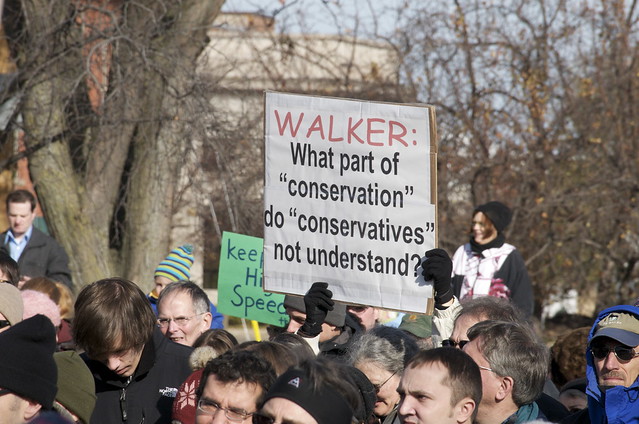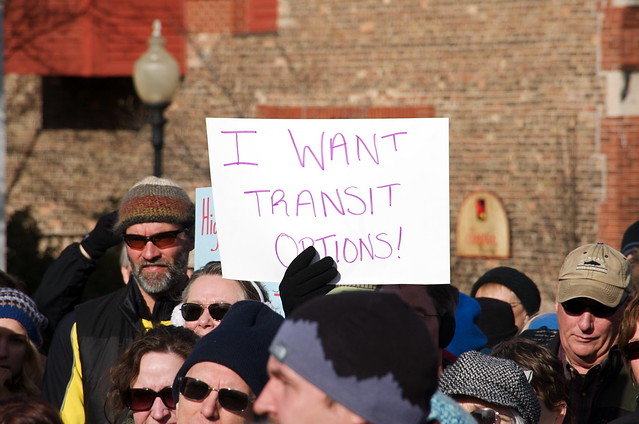I will reiterate that anyone who feels moved to contribute to this blog so that its presence is less sporadic, please contact me and I will grant you the status to contribute directly. So, onward...
-----
On Saturday I attended a pro-train rally here in Madison, WI. There is a push to (re)introduce higher-speed passenger rail to the state. Our Governor-Elect, Scott Walker(R) has clearly stated his intent to kill the rail project and return the federal funds already allocated to WI to improve rail beds and establish new track and a station in Madison.

The rally was small, and poorly announced. The spots I heard on the radio indicated day and time, but not location (duh!). Several speakers presented good information, including one Republican who is a Walker supporter.

Generally the information was fact-based rather than emotional and I couldn't help but to feel cognitive dissonance: This rail option is so clearly a conservative approach to infrastructure growth. What was I missing? I wasn't alone.

There's lots of room for conspiracy about Walker being beholden to road building and other transportation (read: Truck and Auto) based organizations, but it really can't be that simple. I don't believe he's that short-sighted. Or is he caught up in the paradigm that says cars=freedom and poor people travel by train or bus? Has he ever been to the East Coast? Interestingly, a friend who was also at the rally mentioned in passing GM and other corporations buying up and destroying urban rail. That rang a bell deep in my memory, so I came home to do some research.
in the 1920s automaker General Motors (GM) began a covert campaign to undermine the popular rail-based public transit systems that were ubiquitous in and around the country’s bustling urban areas. At the time, only one in 10 Americans owned cars and most people traveled by trolley and streetcar.
It sort of reminds me of "Who Framed Roger Rabbit". It turns out GM wasn't alone in their efforts, and they were hugely successful. They were joined by Standard Oil, Firestone Tire, Mack Truck and Phillips Petroleum.
GM began by funding a company called National City Lines (NCL), which by 1946 controlled streetcar operations in 80 American cities.
“Despite public opinion polls that showed 88 percent of the public favoring expansion of the rail lines after World War II, NCL systematically closed its streetcars down until, by 1955, only a few remained,”
Over the course of three decades, this group of corporations worked to almost entirely decimate rail options in cities. I'm no fan of trolleys and think buses are a fine alternative. My wife has relied on Madison Metro buses for commuting for more than two decades. But they didn't stop there.
Alfred P. Sloan, GM’s president at the time, said, “We’ve got 90 percent of the market out there that we can…turn into automobile users. If we can eliminate the rail alternatives, we will create a new market for our cars.”
Getting inside the government was a logical step, and GM wasted no effort to do so.
GM was later instrumental in the creation of the National Highway Users Conference, which became the most powerful lobby in Washington. Highway lobbyists worked directly with lawmakers to craft highway-friendly legislation”
When GM President Charles Wilson became Secretary of Defense in 1953 [emphasis mine], he worked with Congress to craft the $25 billion Federal-Aid Highway Act of 1956. Referred to at the time as the “greatest public works project in the history of the world,” the federally funded race to build roads from coast-to-coast was on.
Fortunately, GM is not in the same position it was in then, and there is more interest in rational mass transit. Road building is costly, and traffic is getting significantly worse even here in WI. A rail option reduces some of that load - but leaves drivers free to choose to drive - and eliminates a couple of key headaches such as fender-benders and the traffic jams they create, rush-hour crawl, tolls, and most weather related snarls like snow, fog, and heavy rain.

Currently the Amtrak passes about 30 miles from Madison and there is no way to get to the station except by car. The Empire Builder line runs from Seattle-Chicago via Minneapolis and Milwaukee, making it a logical option for a Mnpls-Madison-Chicago connection if it only ran closer or there was a rail line that served the station from here. The trip from Chicago to Columbus, WI, takes 2:45, so a route through Madison instead would not significantly alter that. Driving time to downtown Chicago from here is about the same if all goes well. While riding that train I could read, have a beer, talk with my companions or work mates without the hassle of driving. A weekend getaway becomes a breeze and I don't have to spend upwards of $20/day to park my car. The trip from here to Minneapolis is 5:30, a bit longer than the typical drive time if all goes well.
The government's reimbursement rate for auto travel is $0.50/mile for 2010. Minneapolis is 270 miles. At $0.50, that's a transportation cost, excluding parking, of $135. Let's for the sake of argument assume there are two travelers, so the minimum cost per traveler is $67.50. An Amtrak ticket from Madison (Columbus) to Minneapolis is $56.00. Intracity mass transit will get me around pretty well for that extra $11.50 per person. Chicago is 148 miles, or, using the same rates as above, $37.00 per person for two to drive. Amtrak from Madison to Chicago is $32.00 per person. (Aside: It's interesting to note that my computer's dictionary doesn't even recognize the word intracity. Telling, no? Talk about paradigms.)
Make no mistake: This is still a corporations versus people issue. Substantial corporate dollars are being invested to quash intercity passenger rail in favor of roads and personal transit such as cars. Are you really a fiscal conservative? Then rail makes sense both as a stand alone choice on a dollars to dollars basis, but also as simply an alternative to the private automobile.
And before you jump up and down and yell about Amtrak subsidies, you had better have your ducks in a row and be prepared to talk about the subsidies to road building, GM (hello?), the petroleum industry ($50 Billion/year) and ethanol (which is a rant unto itself). I leave you with this:
Much is made of the $30 billion spent on Amtrak over the last 30 years, but in that same period the federal government spent $1.89 TRILLION on air and highway modes, according to the New York Times and Washington Post.



